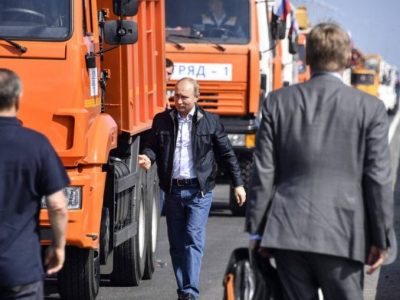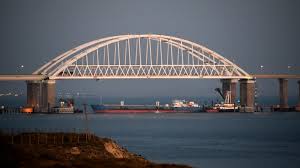Ex-NATO Commander Calls on Ukraine to Blow Up Crimean Bridge

All Global Research articles can be read in 51 languages by activating the “Translate Website” drop down menu on the top banner of our home page (Desktop version).
To receive Global Research’s Daily Newsletter (selected articles), click here.
Follow us on Instagram and Twitter and subscribe to our Telegram Channel. Feel free to repost and share widely Global Research articles.
***
Global Research Editor’s Note
In December 2013, Moscow signed a bilateral agreement with the Yanukovych government in Kiev pertaining to the construction of a bridge across the Kerch Strait, connecting Eastern Crimea (which was part of Ukraine) with Russia’s Krasnodar region.
That agreement was a followup to an initial agreement signed in April 2010 between the two governments.
The Russia-Ukraine 2013 agreement pertaining to the construction of the bridge had, for all purposes already been scrapped before March 16, 2014.
 Image right: new Kerch bridge links Eastern Crimea (road and rail transportation) to Russia’s Krasnodar region. (image right).
Image right: new Kerch bridge links Eastern Crimea (road and rail transportation) to Russia’s Krasnodar region. (image right).
Crimea’s union to Russia was already in the pipeline prior to the referendum, it was a fait accompli.
Less than two weeks before the March 16 2014 Referendum, at the height of the crisis in Ukraine, Russia’s Prime Minister Dmitry Medvedev ordered the state-road building corporation Avtodor, or “Russian Highways” “to create a subsidiary company that would oversee the building of a bridge across the Kerch Strait”.
This bridge was geared towards train transport routes linking Western and Eastern Europe to the Caspian Sea basin, Kazakhstan and China. It is therefore an integral part of the Eurasian Project (linking up with China’s Belt and Road initiative).
In recent developments, “former Commander-in-Chief of the NATO Allied Forces in Europe, General Philip Breedlove, said that the Crimean Bridge is a legitimate target for attack by Ukraine”.
See Ukraine News article below.
Michel Chossudovsky, July 12, 2022
***
Former Commander-in-Chief of the NATO Allied Forces in Europe, General Philip Breedlove, said that the Crimean Bridge is a legitimate target for attack by Ukraine. It is reported by Express on Friday, July 8.
Breedlove indicated that damage to the Crimean Bridge would be a devastating blow to the Kremlin, as it links the Russian mainland to the peninsula. The General called on Ukraine to attack the bridge with Harpoon missiles.
“The Kerch Bridge is a legitimate target. It doesn’t surprise me at all that the Russians are worried about the Kerch Bridge. For them, it is incredibly important. Now that the West has provided Ukraine with Harpoon subsonic cruise missiles with a range of up to 200 miles (321 km), I think the Russians have every reason to worry that Ukraine could attack the bridge,” Breedlove said.
The General said that all bridges have their weak points, and if to hit the Kerch Bridge in the right place, it can fail for some time, but to destroy the structure a more massive bombardment is needed.
As Ukrainian News Agency reported, on April 21, Secretary of the National Security and Defense Council Oleksii Danilov said that as soon as Kyiv had a chance to hit the Kerch or Crimean bridge, it would be done.
On June 15, Major General of the Armed Forces of Ukraine Dmytro Marchenko, in an interview with Radio Liberty, said that the Crimean Bridge would be the number one target for destruction.
On June 16, the Defense Intelligence under the Ministry of Defense of Ukraine received and published detailed technical documentation of the Crimean Bridge.
*
Note to readers: Please click the share buttons above or below. Follow us on Instagram and Twitter and subscribe to our Telegram Channel. Feel free to repost and share widely Global Research articles.
Featured image is from Ukrainian News

